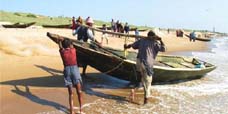
The numbers of socially responsible tourists—and the opportunities available to them—are rising steeply. Rick Lathrop, founder and executive director of Global Service Corps, which took the Closes to Tanzania, says volunteers for programs like trips to Thailand to teach English to monks or to help out in rural health clinics are up 30 percent over last year.
Having Fun Doing Good
For some altruistic travelers, vacations mean more than just a day at the beach.
By Eve Conant
Newsweek International
April 11/18 issue - Jen and Ian Close were ready to try something new. The Canadian couple had traveled to Germany and England to visit family, but not much beyond. So last August they went on safari in Kenya, then capped off their African journey with two weeks of volunteering in Arusha, Tanzania, where they taught local teenagers how to prevent AIDS. "Kenya was great," says Jen. "But we didn't really meet people or get a chance to understand them. We couldn't get out of the trap of being treated like tourists."
advertisement
In Tanzania, on the other hand, the couple received training in how to promote HIV awareness from the San Francisco-based Global Service Corps, which aims to ease the social stigma of AIDS. They lived with a local family and even attended lively church services with them. But the overriding memories are hardly material for a cheery slide show back in Vancouver. "When you see little children sifting through trash, you take that image home with you," says Jen. Once home, she marveled at her privileged life as hot water cascaded from the faucet.
More and more, people like the Closes are using their holidays to help others. Whether it's rebuilding homes in tsunami-hit Sri Lanka, cutting trails in Belize for environmental scientists or teaching English to schoolchildren in Thailand, socially responsible travel is on the rise. Holidaymakers are recognizing that they can have fun doing good; volunteers don scuba gear to record scientific data on dolphins in the Bahamas or lead relief missions on horseback through the Himalayas. It's tourism with a conscience, undertaken by travelers who don't want to experience another culture through the window of a tour bus and who will gladly trade a five-star luxury hotel room for a sleeping bag on the floor of a remote village home. The benefits: you get involved, you make new friends and you come back with a sense of satisfaction and a purpose that no amount of hiking or sunbathing can inspire.
The numbers of socially responsible tourists—and the opportunities available to them—are rising steeply. Rick Lathrop, founder and executive director of Global Service Corps, which took the Closes to Tanzania, says volunteers for programs like trips to Thailand to teach English to monks or to help out in rural health clinics are up 30 percent over last year. He at—tributes the increase, in part, to the current sense of vulnerability many people feel. "It's possible that 9/11 taught us that we're part of a wider family, for better or for worse," he says. "There are a lot of people out there like me, baby boomers with a sense of world peace, who never had a chance to do the Peace Corps." His co-worker, Amy Warren, sees a generational shift back to some of the values of the '60s. "There's a swing from 'Me, me, me, SUV' to 'Hey, that's not so fulfilling. My life is missing some spiritual substance'." The interest transcends borders: conscientious vacations are highly popular among Western Europeans, Australians, Poles and Japanese, as well as North Americans.
To be sure, many of these holidays are considerably more trying than a week at the spa. Volunteer outfits usually require travel, health and emergency-evacuation insurance. Trekforce Expeditions, a U.K.-based charity that sends 18- to 38-year-olds into the jungles of Belize or Borneo to help with conservation, starts each trip with jungle training. Experts teach volunteers about "all the venomous, nonvenomous snakes, all the bugs and the beasties, the biting bits and bobs," says managing director Rob Murray. Once the volunteers know which insects to avoid, they begin the real work: building visitor centers, clearing trails or planting hardwood trees that help regenerate forests after heavy logging.
Such hardships don't come cheap. A four-week Trekforce trip costs about £1,800 and a five-month tour up to £3,900—not including airfare. But depending on their country of origin, most volunteers can deduct a hefty portion of the trip on their taxes. And since Trekforce is a charity, volunteers can also raise money from friends and colleagues to fund their trips. "It sounds arrogant, but we want people to change for the better, to put aside their materialist ways," says Murray. "You've got someone in a pin-striped suit who goes to Belize, and comes home a far more socially responsible person." There's even a hidden bonus: raising thousands of dollars for charity, trekking through the jungle and improving people's lives while on vacation is great for the resume.
The trips seem to have a domino effect. Volunteers have been known to sponsor trips for their local host families to visit the United States or Europe; others get hooked and visit their volunteer vacation spots repeatedly. A few months ago, Singapore-based Brit John Clarke volunteered to assist with tsunami cleanup through Hands On Thailand; he brought his three children, ages 11, 9 and 8, who donned gloves and helped clear debris. "At the end of the day you know you've made a difference, even if it's small," he says. "We tend to focus on ourselves too much."
The experience made such an impression on him that Clarke recently returned with dozens of his co-workers from American Express. Wiping slime off his hands, he grabbed a telephone to speak to NEWSWEEK from Bang Tao Beach, one of the worst hit parts of the Phuket Island. "You have top businessmen here, but all you know is so-and-so is the sledgehammer person, another is the shovel," he says. "When we're not building walls, we're spending all the money we can so that Thailand can get back into the tourism business." More and more companies are sending employees on such expeditions to help with group building, says Trekforce's Murray—a sort of Outward Bound with tangible results. "You've got to get on with the person who sits across from you at work," he says. "You have to be a team player."
Usually such holidays benefit the volunteers at least as much as the locals. Kimberly Haley-Coleman created the Dallas-based Globe Aware four years ago in large part to help compensate for the U.S. bombing campaigns in Laos and Cambodia in the 1970s; her volunteers now assemble wheelchairs from recycled materials for bombing victims there. "Laos is the most bombed country in world history, and we did it," she says. Globe Aware, which has seen its membership quadruple over the past year, encourages volunteers to get more involved in the local community by giving them fun assignments, like going into a village and asking, "Are Buddhist monks vegetarian?" "They're not; they accept alms, and eat whatever they're given," says Haley-Coleman. "But you'd never know it unless you went up to one and —asked them. They like to talk. We just want people to get beyond what a tourist would see or do."
Trips like these aren't just for the young and vigorous. Gianna Hochstein, a 78-year-old anthropologist from California, went to Tanzania in 2003 to lead HIV/AIDS awareness classes. "Many anthropologists believe you shouldn't get involved," she says. "I'm an adventurer, but I'm a do-gooder, too." Still, Hochstein admits her age was an obstacle; during her home stay, she learned that Tanzanians are obsessive about locking their doors, which proved hard on her arthritis. But the insights she gained far outweighed the difficulties. For one thing, she learned not to judge Tanzanian abodes by their appearance. "Their home was so attractive inside, but from the outside it looked quite miserable," she says. When the 13-year-old girl in her family got in trouble at school for showing her knees beneath her skirt, "it was just because she had grown so quickly," says Hochstein. "I learned that Tanzanians can be very modest." She'd like to go back and do more AIDS-awareness work—not that the trips are strictly "work," says Hochstein. Being helpful while enjoying oneself is a lot more rewarding than simply having a good time.
© 2005 Newsweek, Inc.















